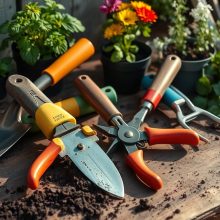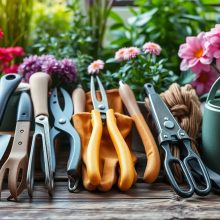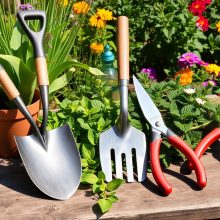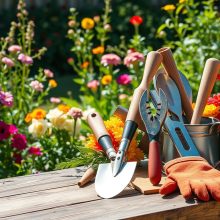The Ultimate Guide to Must-Have Gardening Tools
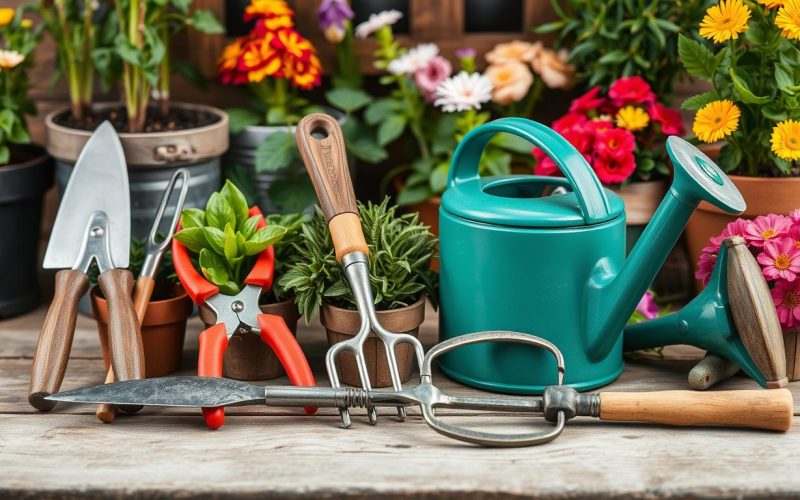
Ever wondered why some gardeners make beautiful gardens while others face challenges? The key is having the right gardening tools.
Gardening tools have been crucial for humans since ancient times. From basic hand tools to advanced power tools, the selection has grown a lot. Knowing the best gardening supplies can make gardening fun and easy.
For thousands of years, humans have used special gardening tools. Today, gardeners have many tools to make gardening better and more fun.
Key Takeaways
- Gardening tools range from simple hand tools to advanced power equipment
- Proper tool selection dramatically improves gardening efficiency
- Different tools serve specific purposes in garden maintenance
- Investing in quality tools can enhance overall gardening experience
- Understanding tool functionality is crucial for successful gardening
Understanding the Importance of Gardening Tools
Gardening is an art that needs the right tools to shine. Good gardening tools make gardening fun and easy. They make every task more efficient and less tiring.
Choosing the right tools has many benefits for gardeners:
- Improved efficiency in garden tasks
- Reduced physical strain during work
- Better plant care and maintenance
- Prevention of potential plant damage
- Enhanced gardening precision
Benefits of Using Quality Tools
Professional gardeners know that quality tools are vital. They are not just accessories. They are key to better gardening.
Good tools help you work smarter, not harder. They are durable and well-designed.
Ergonomic tool designs are important. They reduce fatigue. Tools that fit well in your hands and support you let you garden longer without getting tired.
How the Right Tools Enhance Gardening Experience
The right tools make gardening easy. They help with everything from pruning to soil preparation. Each tool has a special purpose that makes gardening more productive and fun.
Choosing tools that fit your gardening needs helps you get better results. You’ll need less effort to achieve more.
Essential Hand Tools for Every Gardener
Every successful gardener knows that the right tools make gardening fun. Essential tools help you keep your garden beautiful and healthy. They are the key to a productive garden.
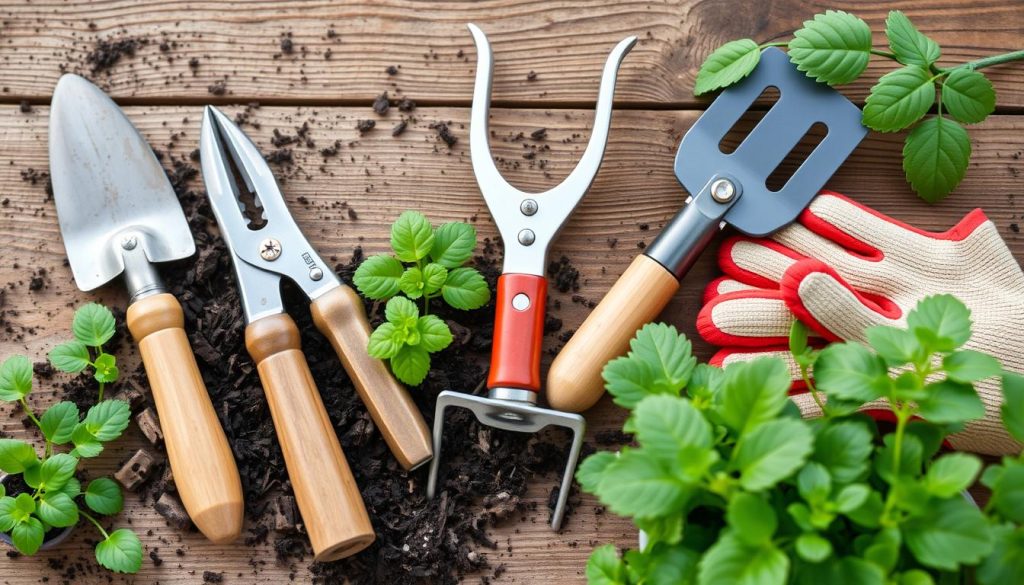
When you’re building your gardening toolkit, choose tools that are versatile and of high quality. These tools will make your gardening tasks easier and more efficient.
Trowels: The Versatile Companion
A garden trowel is a must-have tool. It’s about 14 inches long, perfect for digging, planting, and transplanting. Look for trowels with:
- Stainless steel blades for durability
- Ergonomic handles to reduce hand fatigue
- Comfortable grip for extended use
Hand Pruners: Precision in Trimming
Hand pruners are key for keeping plants healthy. 85% of gardeners say they’re essential. Choose pruners that can cut branches up to one inch in diameter for the best results.
- Bypass pruners for clean cuts on live plants
- Compact design for easy handling
- Sharp blades for precise trimming
Weeders: Keeping Your Garden Clean
Weed control is crucial for a healthy garden. Your toolkit should include specialized weeders for efficient weed removal. Gardeners see a 50% reduction in weeding time with the right tools.
- Hand cultivators for small areas
- Hoes for larger garden spaces
- Ergonomic designs to minimize strain
Investing in quality hand tools will make gardening more enjoyable. It will also make maintenance tasks more effective.
Power Tools That Make Gardening Easier
Modern gardening has been changed by power tools. These tools make hard tasks easy. Garden tillers and leaf blowers are key for all gardeners.
Power tools make gardening easier and less tiring. The market for these tools grew to $13.38 billion in 2020. This shows more people want better gardening tools.
Garden Tillers: Perfecting Soil Preparation
Garden tillers are a big help for soil. They:
- Quickly break up hard earth
- Efficiently mix in soil amendments
- Make garden beds easy to prepare
When picking a tiller, think about your garden size and soil. Electric tillers are good for small spaces. Gas models are better for big gardens.
Leaf Blowers: Managing Garden Debris
Leaf blowers are key for a clean garden. They:
- Fast clear leaves
- Get rid of grass clippings
- Clean gutters and patios
- Help with yard work
Today’s leaf blowers come in many sizes and powers. This lets gardeners pick the right tool for their garden.
Choosing the Right Garden Hose and Accessories
Finding the perfect garden hose is key to keeping your outdoor space in top shape. The right hose makes watering plants and cleaning up easier. It’s important to know about hose types and accessories when looking for the best gardening supplies.
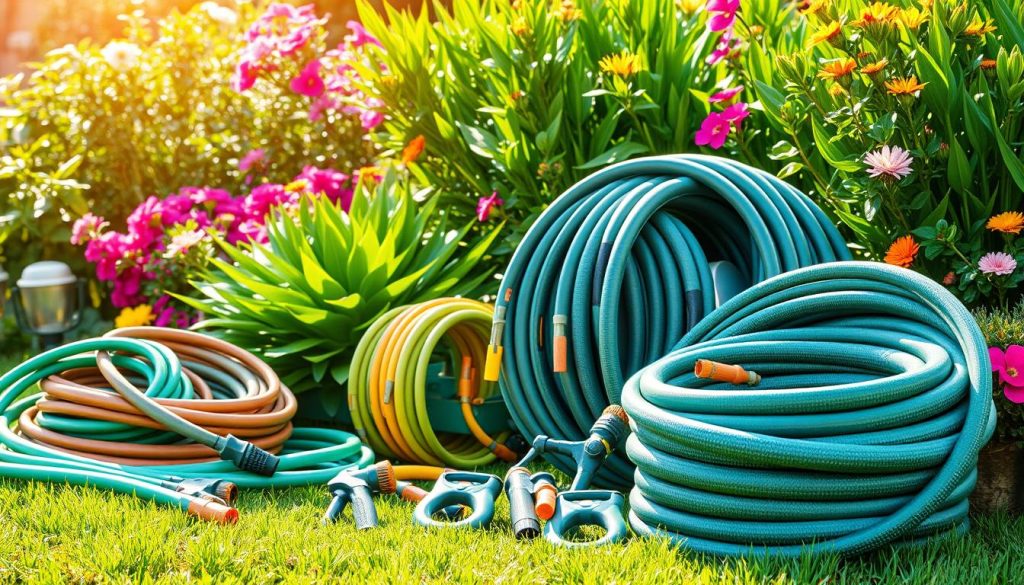
Garden hoses come in many materials and styles, each for different gardening tasks. Knowing which one fits your needs can upgrade your gardening tools.
Hose Types: Finding Your Perfect Match
Different hose materials have their own benefits:
- Rubber Hoses: Most durable, great for heavy use
- Vinyl Hoses: Light and affordable
- Reinforced Hoses: Strong against kinking
Think about these when picking a hose:
- Length (50-100 feet is best)
- Diameter (1/2″ to 3/4″ is standard)
- How flexible and durable it is
Essential Accessories: Maximizing Hose Functionality
Boost your gardening with these must-have accessories:
- Quick-connect fittings for easy hook-up
- Adjustable nozzles for precise watering
- Brass connectors for reliable use
- Sprinklers for even lawn watering
Quality garden hoses and accessories lead to efficient watering and lasting performance. Choose tools that meet your gardening needs for the best results.
Storage Solutions for Your Gardening Tools
Keeping your gardening tools in good shape is important. It helps keep your outdoor area tidy. The right storage keeps your tools safe and makes gardening easier.
Did you know 60% of gardeners save 30 minutes per session with organized tools? The right storage can make gardening more efficient.
Tool Sheds: Comprehensive Storage Options
Tool sheds are great for storing your tools. Prices start at $500 for basic ones and go up to $5,000 for custom sheds. Look for:
- Weather-resistant materials
- Good ventilation to avoid mold
- Shelves for better use of space
- Security features
Outdoor Cabinets: Compact Gardening Tool Storage
Outdoor cabinets are perfect for small spaces. 75% of users like wall-mounted pegboards for easy access. Here are some options:
- Deck boxes for small storage
- Wall hooks and racks
- Labeled storage bins
- Multi-shelf systems
DIY storage can save 20-50%. With 70% of users wanting better organization, a smart system is worth it.
Organizing Tools for Easy Access
Organizing your tools is crucial. Put heavy items on lower shelves and use pegboards for vertical space. Heavy-duty bins with locks are also good. These tips keep your tools safe and easy to find.
Sustainable Gardening Tools
Green gardening is more than a trend—it’s a commitment to protect our planet. Eco-friendly gardening tools help gardeners reduce their environmental footprint. They keep our outdoor spaces beautiful.
Sustainable gardening equipment has changed how we garden. These tools are made with the environment in mind. They use materials and processes that harm the planet less.
Eco-Friendly Options for the Green Gardener
When picking sustainable gardening tools, look for these features:
- Tools made from recycled materials
- Biodegradable components
- Manual tools that don’t use fossil fuels
- Implements with bamboo or reclaimed wood handles
- Products with long-lasting durability and lifetime warranties
Lasting Impact: Why Go Green with Tools?
Choosing eco-friendly gardening tools has many benefits. These tools are often more durable than traditional ones. For example, the Felco F-2 Classic Manual Hand Pruners last a long time. They can cut branches up to 1 inch in diameter.
By choosing sustainable gardening equipment, gardeners cut down on waste. They also support eco-friendly manufacturing. These tools save money and help the environment in the long run.
Using eco-friendly gardening tools is more than just about the tools. It’s about gardening in a way that respects and protects our planet.
Specialty Tools Worth Considering
Gardening enthusiasts know that the right tools can make a big difference. Basic tools cover most needs, but specific tools can make tasks easier and more efficient.
Choosing the right specialty tools means understanding their unique uses. They can greatly benefit your gardening project.
Hoe: The Traditional Workhorse
The hoe is a classic tool for gardeners. Different types serve different needs:
- Draw hoes for creating furrows
- Scuffle hoes for weeding
- Wheel hoes for larger garden areas
Today’s hoes are lightweight and efficient. They usually weigh about 3 pounds and cost between $20-$40.
Rake and Cultivator: For Perfect Soil Texture
Rakes and cultivators are key for soil preparation. They help:
- Level garden surfaces
- Remove garden debris
- Break up compacted soil
- Create ideal seedbeds
Specialty tools like cultivators can greatly improve soil texture. Prices range from $30 to $100, depending on size and complexity.
Investing in these tools can make gardening more precise and enjoyable. It benefits both new and experienced gardeners.
Safety Gear for Gardening
Gardening is a rewarding hobby, but it comes with risks. It’s important to protect yourself with the right safety gear. This gear can prevent injuries and make gardening more enjoyable.
Statistics show the need for safety precautions. The Centers for Disease Control and Prevention reports about 35,000 gardening-related injuries each year. Sadly, about 75% of gardeners don’t wear enough safety gear, which increases their risk of injury.
Gloves: Protecting Your Hands
Gloves are the most important safety item for gardeners. They protect against:
- Cuts and scrapes from thorny plants
- Blisters from tool handling
- Soil-borne pathogens
- Chemical exposure
The Occupational Safety and Health Administration (OSHA) says safety gloves can cut hand injuries by up to 70%. Choose gloves based on your gardening tasks:
- Leather gloves for heavy-duty work
- Nitrile gloves for wet conditions
- Breathable cotton gloves for light gardening
Sun Protection: Staying Safe While Gardening
Protecting yourself from the sun is crucial when gardening outside. Here are some essential safety items:
- Wide-brimmed hat to shield your face
- UV-blocking sunglasses
- High-SPF sunscreen (at least SPF 30)
- Long-sleeved shirts and pants
Other safety tips include using knee pads and protective eyewear with power tools. By using the right safety gear, you can avoid injuries and enjoy gardening more.
Tips for Maintaining Your Gardening Tools
Keeping your gardening tools in good shape is key to making them last longer. Studies show that tools cared for properly can last up to 50% longer than those ignored. It’s not just about cleaning them; it’s about protecting your investment and keeping your garden in top shape.
Cleaning is a big part of tool care. Experts say to clean off dirt and debris right after use to stop rust and disease. A simple routine can help a lot: use a stiff wire brush to remove soil, and mix vinegar and water for rust. Dull blades can damage plants up to 30% more, so sharpening tools regularly is crucial.
Cleaning and Sharpening Tools for Longevity
For tools like pruners, deep cleaning at least once a year is a good idea. A diluted bleach solution can sanitize tools touched by diseased plants. Applying boiled linseed oil after cleaning can cut rust by about 60%. Wooden handles need special care; they can break 50% more without oil, so use mineral or linseed oil to prevent damage.
Storing Tools Properly to Prevent Damage
How you store your tools is just as important as how you clean them. Storing tools in a dry spot can cut rust by 45%. Keep them in a clean, dry place to prevent damage. A light oil coating on metal parts and regular checks for loose parts will keep your tools in great shape for years.
